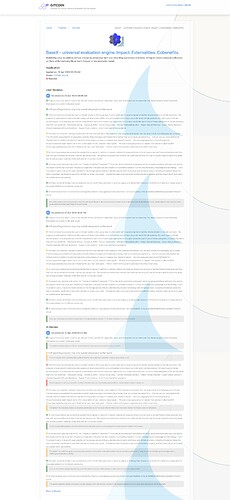Thanks to @harryeastham for seeding the concept and to @umarkhaneth for reviewing.
tl;dr The following ideation post proposes a prototype for a data app to inspire confidence in potential grantees on Gitcoin Grants (GG) and Independent Rounds by demonstrating other successful funding journeys on Grants Stack. This post kick-starts an 8-week timeline to accelerate from idea to app using Citizens Innovate by supporting and funding builders with the most robust proposals.
Timeline:
- May 2 - May 16th: The post will be open for feedback on the gov forum until May 16th, along with a sign-up form for Citizens interested in opting for a direct grant to build the prototype
- The week of May 20th: A debrief call and 1:1 sessions the following week with Citizens interested in submitting their proposal for funds to build the prototype
- The week of May 27th: The Grant Council may approve one or more GCPs to implement the functionality
- June 3rd to June 28th: 4-week timeline to implement the prototype with interim demos as well as support and mentorship from Gitcoin team members with context on the problem
Hypothesis
Prospective Gitcoin grantees are more likely to apply for a grant on Grants Stack when they see the journey of similar grantees in their niche who have successfully raised funds on Gitcoin Grants and Independent Rounds.
Validation
We propose a self-service data app prototype designed to test this hypothesis for potential applicants. This prototype will allow users to input a summary of their project and retrieve information about similar grantees who have previously participated in Gitcoin grants. The prototype will provide answers to questions like:
- Which projects similar to ours have participated on Gitcoin in the past?
- How much funding have these projects raised over time?
- How much funding can we expect to receive for our project?
- Which funding rounds are we eligible to apply for?
- What attributes are key to increasing the chances of being accepted in these rounds?
- What else?
Technical Considerations
These are for reference only. Interested builders are encouraged to research and opt into most appropriate approaches to address the problem.
Where can I find data about past grantees?
Databases such as RegenData and Gitcoin Grants Data Portal provide valuable information that can be leveraged to support prospective grantees. These databases can retrieve:
- A list of past grantees whose work is similar to the user’s project.
- The trend of their participation in Gitcoin, including the number of contributors and the amount raised over time.
How do I find grantees similar to the applicant?
To facilitate this, clustering algorithms can be employed to match a given project description with similar grantees. For an example of how feature extraction, dimensionality reduction, and similarity measurement are implemented, refer to the GrantsScope App for GreenPill x Octant round. Click here for the GitHub Repo. Advanced approaches involving Retrieval-Augmented Generation (RAG) or fine-tuning LLMs might also be relevant here.
How do I estimate how much funding a prospective grantee can expect?
The historical curves in the power law distribution of the matching pool could provide a suggestive range of funds that could be raised in a QF round. This estimation requires assumptions for percentile rank and the size of the matching pool.
Limitations and Risks
-
User Assumptions and Expectations: The tool relies on user inputs regarding their assumptions about percentile rank and matching pool size to estimate potential funding. Incorrect assumptions or a lack of understanding about these parameters could lead to unrealistic expectations about the funding amount. Educating users on how to make informed assumptions is crucial.
-
Algorithm Bias and Fairness: The algorithms used may inadvertently favor certain types of projects or grantees based on the data they have been trained on. This could lead to a lack of diversity in the recommended or seen as successful projects, potentially reinforcing existing biases in funding allocation.
-
Complexity of Clustering Algorithms: Clustering algorithms are central to matching project descriptions with similar past grantees. However, these algorithms’ complexity could lead to implementation and maintenance challenges. There’s also the risk of overfitting, where the model is too closely fitted to the historical data, potentially making it less effective in predicting or matching new, unseen projects.
Next Steps
- Share your feedback here on the hypothesis and validation approach before May 16th
- Sign up here if you want to opt in for a deeper dive to submit a proposal to build this prototype or to shadow along the discussions and demos.
